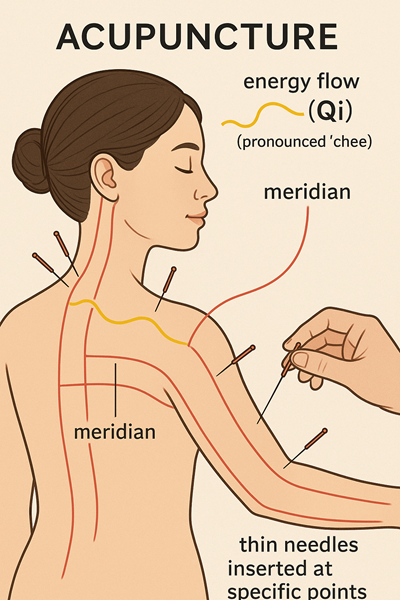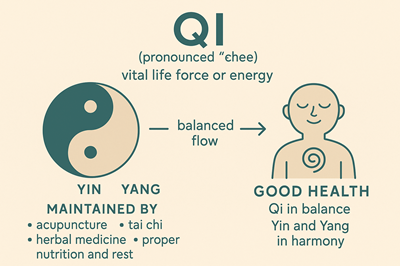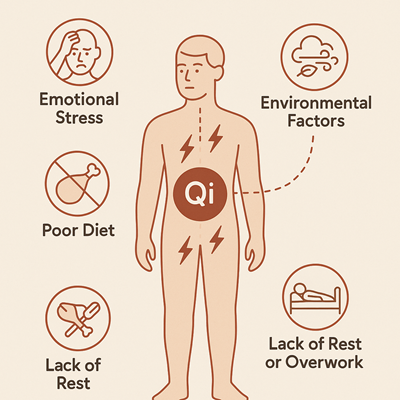What is acupuncture?
Acupuncture is a form of traditional Chinese medicine that involves inserting very thin needles into specific points on the body to stimulate healing, relieve pain, and improve overall health. It has been practiced for thousands of years and is based on the concept of balancing the body’s energy flow, known as Qi (pronounced “chee”), which is believed to travel through pathways called meridians.
Key Points:
Purpose: Acupuncture is used to treat a wide range of conditions, including chronic pain (like back pain, arthritis, or migraines), stress, anxiety, digestive issues, and more.
How It Works (from a modern perspective): While the traditional theory focuses on energy flow, modern science suggests that acupuncture may stimulate nerves, muscles, and connective tissue, boosting blood flow and triggering the body’s natural painkillers (like endorphins).
What to Expect: During a session, a licensed acupuncturist inserts sterile, hair-thin needles into specific points on the body. Most people feel minimal or no pain during the treatment. Sessions typically last 30–60 minutes.
Safety: When performed by a qualified professional, acupuncture is considered safe with few side effects.
What is Qi?
Qi (pronounced “chee”) is a fundamental concept in traditional Chinese medicine and philosophy. It refers to the vital life force or energy that flows through all living things. The idea is that when Qi flows freely and in balance through the body’s pathways (called meridians), a person experiences good health. When Qi is blocked, weak, or imbalanced, it can lead to illness or pain.
Key Ideas About Qi:
Qi represents a combination of biological, mental, and spiritual energy.
Maintained and balanced through;
- Acupuncture
- Tai Chi or Qi Gong
- Herbal medicine
- Proper nutrition and rest
- Yin and Yang are also tied to Qi — balancing the two is considered essential for health.
In modern terms, you can think of Qi like a metaphor for the body’s natural self-regulating, healing energy — similar to how Western medicine views homeostasis or nervous system balance.


How is Qi Interupted?
Qi (life energy) can be interrupted, blocked, or imbalanced by a variety of physical, emotional, and environmental factors, according to Traditional Chinese Medicine (TCM). When Qi doesn’t flow properly through the body’s meridians, it may lead to pain, illness, fatigue, or emotional distress.
Common Causes of Qi Disruption:
🧠 Emotional Stress
Excessive worry, anger, fear, grief, or anxiety can stagnate or deplete Qi.
Example: Chronic stress might block liver Qi, leading to digestive issues or irritability.
🍽️ Poor Diet
Overeating, undereating, or eating too much processed, cold, or greasy food can weaken or stagnate Qi, especially in the spleen and stomach systems.
🛌 Lack of Rest or Overwork
Not enough sleep or working beyond your capacity drains Qi, particularly kidney Qi (related to core vitality).
🌬️ Environmental Factors
Wind, dampness, cold, or heat (as defined by TCM) can invade the body and disturb the flow of Qi.
Example: Exposure to cold and dampness may block Qi and cause joint stiffness or colds.
🚶♂️ Lack of Movement
A sedentary lifestyle can cause Qi stagnation, especially in the liver and limbs.
Gentle movement like Tai Chi or walking helps keep Qi flowing.
🦠 Injury or Illness
Physical trauma or chronic disease can block or weaken Qi in the affected areas.
😤 Suppressed Emotions
Bottling up feelings or not expressing emotions healthily can create internal stagnation.
- Signs Qi May Be Disrupted:
Fatigue or low energy - Poor digestion
- Frequent colds or slow healing
- Mood swings or anxiety
- Muscle tension or pain
- Insomnia
What Does an Acupuncturist Do?
During your first visit, the acupuncturist will take a detailed health history. You’ll be asked about your overall health, specific symptoms, and daily lifestyle habits. A physical exam is also performed, which may include checking your pulse and examining your tongue—important diagnostic tools in Traditional Chinese Medicine.
This comprehensive assessment helps the acupuncturist identify any imbalances in your Qi, or life energy, that may be contributing to your health concerns. From there, a personalized treatment plan is created.
Once the Qi imbalances are identified, the practitioner gently inserts fine, sterile needles into specific acupoints along your body’s meridian pathways. This process is safe and virtually painless. The goal is to clear any blockages and restore the natural flow of Qi.
When Qi flows freely, it nourishes your cells, organs, and tissues, helping to relieve pain, support healing, and bring your body back into balance. Over time, this can lead to improved well-being and optimal health.

